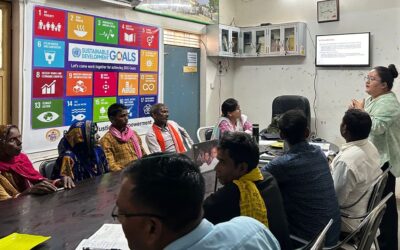It was just over a year ago—January 2010—that Free the Slaves partners in India staged a raid and rescued 49 bonded laborers from a brick kiln near the village of Bahari. It turned out that 18 of the rescued laborers were originally from Bihar. They were able to secure release certificates, which officially relieved them from all legal obligations to their slave holders, and go back to their homes.
Bahari village is currently taking part in FTS’s Free a Village Build a Movement project, in which entire communities are brought out of generational slavery through community-wide reform and empowerment. (Read more about how Free a Village Build a Movement works here.) Last August, the villagers came together to open a schoolhouse. Now, 45 children—many of whom were former slaves—have access to education.
But the next month, the slaveholders retaliated. Bahari village is a small hamlet, accessible through one narrow road. The slaveholders obstructed this route by erecting a massive brick structure. In an email, Bhanuja Sharan, Director of our partner organization in India MSEMVS described this move as “punishment of the residents” for standing up to their traffickers.
But the people of Bahari didn’t take this attack lying down. As part of the Free a Village Build a Movement project, the villagers had launched a Community Vigilance Committee (CVC). CVC members are made up of members of the community—many of them former slaves. They help educate their fellow villagers of their rights, and teach them how to ward off traffickers. They organize and appeal to the local government to uphold the rule of law, punish traffickers, and protect survivors.
The Bahari CVC immediately contacted MSEMVS when their road was obstructed. Together, they went to the District Magistrate’s office to demand action. In a matter of hours, a team of police arrived in Bahari, and helped the villagers take down the blockade. Bhanuja said MSEMVS staff stayed with the villagers that night “to help them remain confident. The road into the settlement has always been too narrow, so now they are demanding a proper road.”
That demand has been met. After months of appeals to the local government, the people of Bahari village were granted permission to build a much-needed, well-paved road. The construction of this road means that villagers will have easy access to outside communities, which makes them less vulnerable to slaveholders. Villagers—many of whom are survivors of slavery—are being employed to build the road. This means income, and above all, self-sufficiency.
In a recent email to Free the Slaves, MSEMVS Director Bhanuja said the Free a Village Build a Movement campaign was a “rebirth” for the village of Bahari. With newfound confidence, they organized and persuaded the local government to meet their needs. The road is a grand symbol of the villagers’ emancipation. Now, Bhanuja says, “they have started climbing [to] the height of living with human dignity.” He concluded, “This is a very happy moment for them.”
Go here to learn more about our Free a Village Build a Movement campaign.




